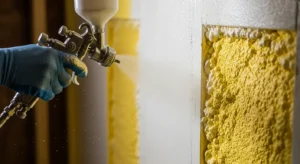Soundproof insulation is your best friend when creating a peaceful & quiet environment in your home or office. Soundproof insulation can significantly improve your quality of life, whether you’re trying to block out noisy neighbors, street traffic, or loud machinery. However, one common question is, “How thick should insulation be for soundproofing?” This blog will explore the importance of soundproof insulation thickness and provide valuable insights into optimizing your soundproofing project.
Understanding Soundproof Insulation
Soundproof insulation, often called acoustic insulation, is a specialized type designed to minimize sound transmission. It absorbs, blocks, or dissipates sound waves to create a quieter indoor environment. Soundproof insulation is commonly used in walls, floors, ceilings, and other areas to reduce noise intrusion.
Factors Affecting Soundproof Insulation Thickness
The thickness of soundproof insulation you need depends on several factors:
1. Sound Frequency and Intensity
Different sound frequencies require different levels of insulation to reduce noise effectively. Lower frequencies, such as deep bass, are more challenging to block than higher frequencies. Intense sounds also require thicker insulation for adequate soundproofing.
2. Material Type
The type of soundproof insulation you choose plays a significant role in determining the required thickness. Common materials include fiberglass, mineral wool, and foam boards. Some materials are more effective at soundproofing than others, allowing for thinner layers.
3. STC Rating
The Sound Transmission Class (STC) rating measures how well a material can reduce airborne sound. The higher the STC rating, the better the material is at soundproofing. Choosing insulation with a higher STC rating can reduce the required thickness.
4. Wall Structure
The construction of the wall, floor, or ceiling where you’re installing the insulation can impact the necessary thickness. For example, a double-layered drywall can reduce the need for thicker insulation.
Also Read: Insulation Benefits How It Adds Value To Home Business
Recommended Thickness for Soundproof Insulation
While the ideal thickness for soundproof insulation can vary based on the factors mentioned, a general guideline is to aim for at least 2 inches (5 cm). This thickness can effectively reduce mid-range frequencies and everyday household noises. However, in situations where noise levels are exceptionally high or you’re dealing with low-frequency sounds, you may need thicker insulation.
A combination of thicker insulation and other soundproofing techniques, such as decoupling and adding mass, can be employed for superior soundproofing. It’s essential to consider the specific noise issue you’re trying to address and consult with a soundproofing professional for tailored recommendations.
Why Hire a Professional for SoundProofing?
Hiring a professional for soundproofing has several advantages, as soundproofing can be a complex and technical task that requires expertise and experience. Here are some reasons why it’s beneficial to hire a professional for soundproofing:
Customized Solutions: Professionals can tailor soundproofing solutions to your unique needs. They will consider factors like the noise source, the building’s structure, and your budget to create a customized plan.
Proper Materials and Techniques: Professionals have access to high-quality soundproofing materials and the expertise to install them correctly. This ensures that the soundproofing is practical and durable.
Time and Energy Savings: Soundproofing can be time-consuming and physically demanding. Hiring a professional saves you the time & effort required to research, purchase materials, and complete the installation.
Guaranteed Results: Reputable professionals often provide warranties or guarantees for their work. If the soundproofing doesn’t meet your expectations or perform as promised, they will address the issue at no extra cost.
Minimized Mistakes: DIY soundproofing attempts can lead to mistakes that are costly to fix. Professionals are less likely to make errors, saving you money and frustration in the long run.
Safety: Some soundproofing projects may involve working with heavy materials or installing soundproofing in hard-to-reach places. Professionals are trained in safety procedures to prevent accidents or injuries.
Aesthetic Considerations: Soundproofing can sometimes impact the appearance of a room or building. Professionals can find solutions that minimize the impact on aesthetics while providing effective soundproofing.
Conclusion
Achieving a quiet and peaceful living or working environment through soundproof insulation is not just about thickness; it’s about understanding the nature of the noise you want to block. While a general guideline of 2 inches is a good starting point, the thickness you need can vary based on factors like sound frequency, material choice, STC rating, and wall structure. For the most effective soundproofing results, consult experts and consider combining techniques to ensure your space remains comfortably quiet. Soundproof insulation can transform your environment, making it a haven of peace and tranquility amidst the outside world’s chaos.
Regain your peace with the touch of an expert! Contact Air Seal IS at (718) 821-6800 and let tranquility become your new norm. Your ears will thank you!



